In a statement released by the foreign office on Sunday, Pakistan condemned the ‘inhuman act’ of a suicide bombing claimed by Daesh in a packed hotel wedding hall in western Kabul that killed 63 people and injured almost 200 on Saturday.
Islamabad reiterated its support for Afghanistan’s fight against militancy, at a time when violence in the country shows little signs of easing, and as US and Taliban delegates inch toward signing a peace deal which would eventually lead to the complete withdrawal of all foreign troops from Afghanistan, after nearly 18 years of the group’s ouster by Washington.
“We express our heartfelt condolences to the families of innocent victims... Terrorism is a common threat for the entire region and must be defeated together,” the statement said.
What was supposed to be a special night for Mirwais Elmi soon turned into a bloodbath after a suicide bomber detonated explosives in the hotel hall where his wedding ceremony was taking place.
Elmi and his bride – who were in separate areas of the venue – survived the blast which took place just before dinner was to be served to the nearly 1,000 guests who had gathered for the event in the southwestern part of the city.
Speaking to a private TV channel on Sunday, a visibly-shaken and shocked Elmi was unable to describe the carnage that took place.
“I am not a groom today, my family, my friends are all in grief,” Elmi who is in his early 20’s and works as a tailor said, adding that he never thought “that such an incident will happen during my wedding party.”
As survivors buried victims of the attack, an infant’s milk bottle and an invitation card could be seen strewn near one of the hotel’s walls, badly damaged from the blast’s impact.
On Sunday, Daesh claimed responsibility for the attack in a statement on a website called Telegram. The group first emerged in Afghanistan in 2014, and has since claimed many deadly attacks against minority communities in the country.
Earlier, the Taliban distanced themselves from the blast and strongly condemned it.
Elmi’s father-in-law lost 14 members of his family, while another man lost three of his sons, four nephews and five of his aunt’s grandchildren, according to survivor accounts.
“My family, my bride are in shock, they can not speak. My bride keeps fainting. I lost my brother, i lost my friends, i lost my relatives. I will never see happiness in my life again,” he said.
All five members of the music band which had been hired for the event died on the spot, too.
None of the guests were government officials, sought by Daesh or any other militant group. The groom and bride’s families, like many of those attending the ceremony, belonged to poor families.
Several of the victims were children and young men from the Shiite and Hazara communities, both of which have come under a spate of attacks, claimed by Da’esh and its affiliates, in recent times.
The hotel had no guards and guests were not body searched either, according to survivors. Shiite mosques, several cultural centers and at least one massive anti-government protest was subjected to such attacks recently, but Sunday’s attack on the wedding ceremony was the rarest of its kind, eliciting a reaction from President Ashraf Ghani who blamed the group for the incident.
“I strongly condemn the inhumane attack on the wedding hall in Kabul last night. My top priority for now is to reach out to the families of victims of this barbaric attack. On behalf of the nation I send my heartfelt condolences to the families of those who were martyred,” he tweeted.
“Taliban cannot absolve themselves of blame, for they provide platform for terrorists,” it added.
Shahzada Masood, a former government adviser said that by conducting such attacks, foreign “intelligence networks” were damaging the peace process, adding that any plans to divide Afghans on ethnic and sectarian lines would fail.
He said that another reason for the attack could be to further create a rift and add to the mistrust between the people and the government which was left out of the peace talks, with Ghani pushing to re-elect himself in September’s presidential polls.
The attack which precedes celebrations to mark a centenary of independence exposed the weakness of the government, Ghulam Hussien Nasiri, a lawmaker said.
“This was not the first such attack, government leaders live behind heavily protected compounds, drive in armored vehicles and have their families largely living abroad, but we the ordinary Afghans are suffering routinely,” he told Arab News.
Pakistan condemns Kabul explosion after 63 killed in wedding bloodbath
Pakistan condemns Kabul explosion after 63 killed in wedding bloodbath
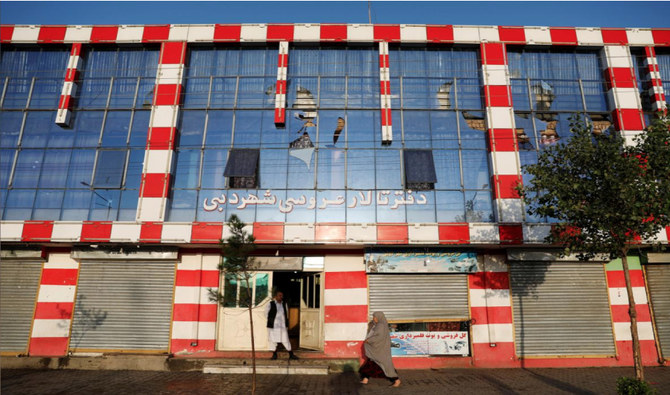
- The suicide bombing, claimed by Daesh, in a packed wedding hall has been condemned by the Taliban
- Pakistan’s Foreign Office said terrorism was a common threat for the entire region and must be defeated together
Five Japanese workers narrowly escape suicide bombing in Karachi
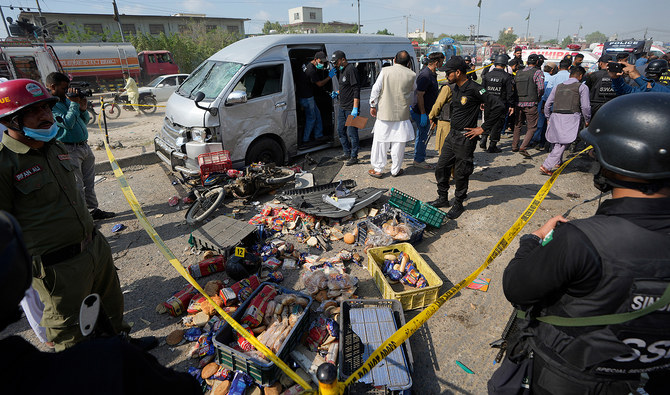
- Van attacked while heading to industrial area where five Japanese nationals worked at Pakistan Suzuki Motors
- Insurgents have recently targeted Chinese working on projects relating to China-Pakistan Economic Corridor
KARACHI: Five Japanese workers narrowly escaped on Friday after a suicide bomber detonated his explosive-laden vest near the van carrying them to their workplace, police said.
The Hiace van was on its way to an industrial area where the five Japanese nationals worked at Pakistan Suzuki Motors, according to local police chief Arshad Awan.
Police escorting the vehicle returned fire after coming under attack, killing an accomplice of the suicide bomber whose remains were found from the scene of the attack, he added. Three bystanders were wounded.
“All the Japanese who were the target of the attack are safe,” Awan told media.
Television footage on local news channels widely showed a damaged van, as police officers arrived at the scene of the attack. Awan said the three passersby who were wounded in the attack were in stable condition at a hospital.
Police were escorting the van after receiving reports about possible attacks on foreigners who are working in Pakistan on various Chinese-funded and other projects, said Tariq Mastoi, a senior police officer. He said a timely and quick response from the guards and police foiled the attack and both attackers were killed.
Prime Minister Shehbaz Sharif condemned the incident, according to a statement posted on X.
“Timely action by the police saved us from any major loss of life,” he said. “We will not rest until terrorism has been completely eradicated. We will thwart every nefarious act of disturbing the law and order situation.”
Murad Ali Shah, the chief minister of Sindh, of which Karachi is the provincial capital, directed the inspector general to submit a report after investigating the attack, including details on who the attackers were, where they came from, any information on their facilitators and details of explosives used in the blast.
He directed that immediate arrangements be made for the security of all foreigners in the province.
“Anti-national elements want to disrupt law and order, which will not be allowed at any cost,” the CM said, praising what he called timely action of the police in thwarting the attack.
No one immediately claimed responsibility, but suspicion is likely to fall on a small separatist group or the Pakistani Taliban who have stepped up attacks on security forces.
In recent weeks, insurgents have also targeted Chinese who are working in Pakistan on projects relating to the China-Pakistan Economic Corridor, which includes a multitude of megaprojects such as road construction, power plants and agriculture.
In March, five Chinese nationals and their Pakistani driver were killed when a suicide bomber in northwest Pakistan rammed his explosive-laden car into a vehicle when they were heading to the Dasu Dam, the biggest hydropower project in Pakistan, where they worked.
However, Japanese working in Pakistan have not been the target of any such attacks.
With inputs from AP
Saudi deputy defense minister discusses security cooperation proposals with Pakistan army chief
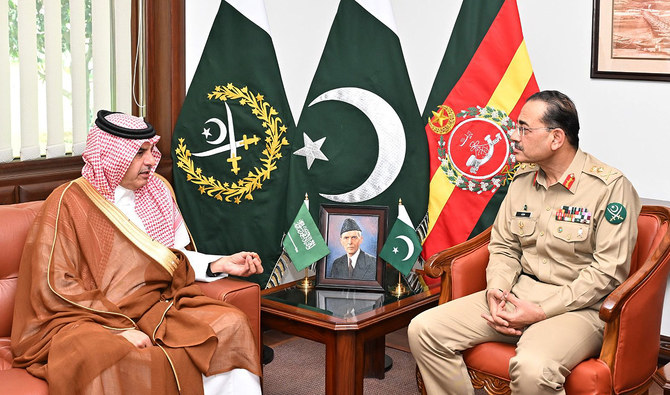
- Al-Otaibi arrived in Pakistan earlier this week to finalize defense-related bilateral projects
- Saudi official participates in the Fifth Meeting of Pakistan-KSA Defense Collaboration
ISLAMABAD: Saudi Assistant Defense Minister Talal Bin Abdullah Bin Turki Al-Otaibi called on Pakistani Chief of Army Staff Gen Syed Asim Munir on Friday and discussed defense collaboration projects, the Pakistani military said on Friday.
Al-Otaibi arrived in Pakistan earlier this week to finalize defense-related bilateral projects, according to the Pakistani defense ministry. His visit follows on the heels of a two-day visit to Islamabad by Saudi Foreign Minister Faisal bin Farhan Al Saud, aimed at enhancing bilateral economic cooperation and pushing forward previously agreed investment deals. Pakistan has said it pitched investment projects worth$30 billion to Riyadh during Prince Faisal’s visit.
“During the meeting, matters of mutual interest and measures to further enhance bilateral defense collaboration including defense production and military training were discussed,” the Pakistan army statement said.
“COAS affirmed Pakistan Army’s continuing support toward capacity building of Royal Saudi Land Forces.
“Both sides reiterated their resolve to solidify the efforts in defense collaboration with focused approach to target specific capabilities in land, air and sea domains. In this context, concrete proposals were deliberated by the forum to meet tangible objectives within specific timelines.”
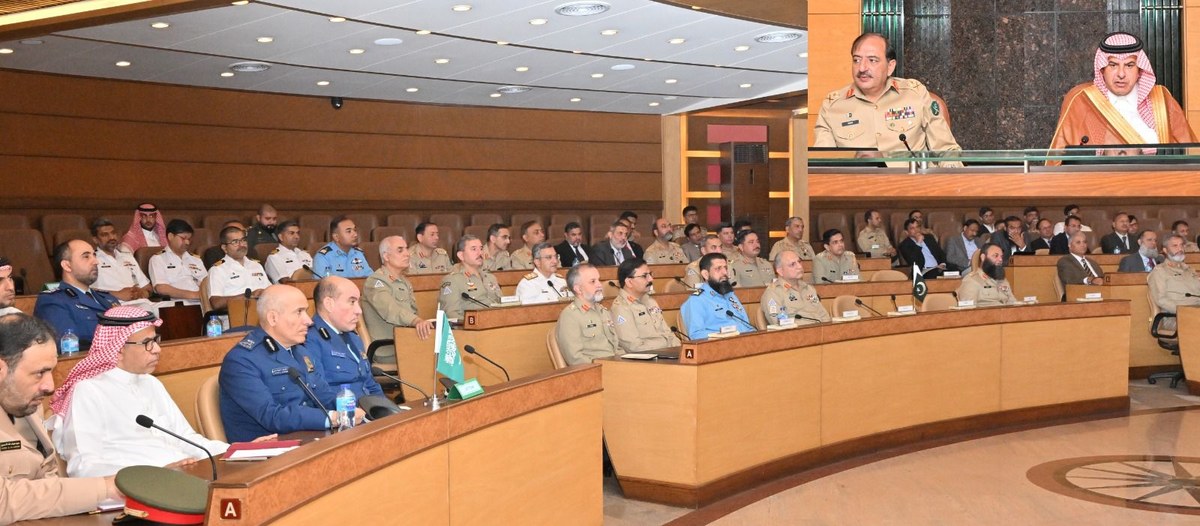
Al-Otaibi also participated in the Fifth Meeting of Pakistan-KSA Defense Collaboration at the Pakistan army’s headquarters in Rawalpindi.
The forum discussed challenges to global and regional security and noted that rapid advancements in modern technologies “necessitated defense industrial cooperation in critical capabilities between the two brotherly countries.”
“The visiting dignitary acknowledged Pakistan Army’s achievements and sacrifices in war against terrorism and Army’s valuable contributions toward regional peace and stability,” the army’s statement said.
Pakistan maintains close military ties with Saudi Arabia, providing extensive support, arms, and training to the Saudi armed forces.
Since the 1970s, Pakistani soldiers have been stationed in Saudi Arabia to protect the Kingdom and Pakistan has also been providing training to Saudi soldiers and pilots. The two nations also regularly carry out multidimensional joint ventures and defense exercises.
Five Japanese workers narrowly escape suicide bombing that targeted their vehicle in Pakistan
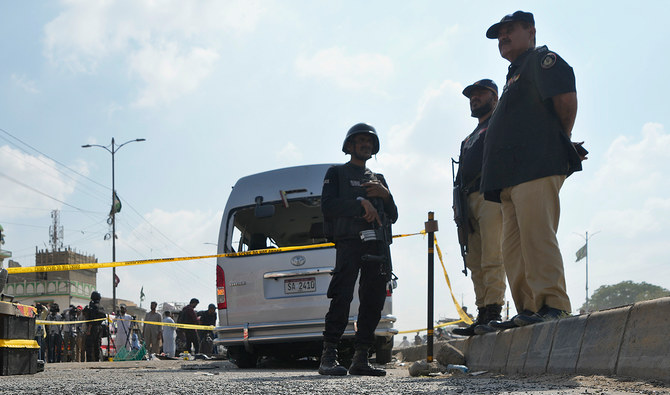
- Van had been heading to an industrial area where the five Japanese nationals worked at Pakistan Suzuki Motors
- Insurgents have also targeted Chinese working on Pakistan on projects relating to the China-Pakistan Economic Corridor
KARACHI: A suicide bomber detonated his explosive-laden vest near a van carrying Japanese autoworkers, who narrowly escaped the attack Friday that wounded three bystanders in Pakistan’s port city of Karachi, police said.
The van had been heading to an industrial area where the five Japanese nationals worked at Pakistan Suzuki Motors, local police chief Arshad Awan said. He said police escorting the Japanese returned fire after coming under attack, killing an accomplice of the suicide bomber whose remains were found from the scene of the attack.
“All the Japanese who were the target of the attack are safe,” he said.
Images on local news channels showed a damaged van, as police officers arrived at the scene of the attack. Awan said the three passersby who were wounded in the attack were in stable condition at a hospital.
Police were escorting the van after receiving reports about possible attacks on foreigners who are working in Pakistan on various Chinese-funded and other projects, said Tariq Mastoi, a senior police officer. He said a timely and quick response from the guards and police foiled the attack and both attackers were killed.
No one immediately claimed responsibility, but suspicion is likely to fall on a small separatist group or Pakistani Taliban who have stepped up attacks on security forces in recent years. Insurgents have also targeted Chinese who are working on Pakistan on projects relating to the China-Pakistan Economic Corridor, which includes a multitude of megaprojects such as road construction, power plants and agriculture.
In March, five Chinese and their Pakistani driver were killed when a suicide bomber in northwest Pakistan rammed his explosive-laden car into a vehicle when they were heading to the Dasu Dam, the biggest hydropower project in Pakistan, where they worked.
However, Japanese working in Pakistan have not been target of any such attacks.
Karachi is the largest city of Pakistan and the capital of southern Sindh province.
Pakistan police kill bomber, militant to thwart attack on Japanese nationals
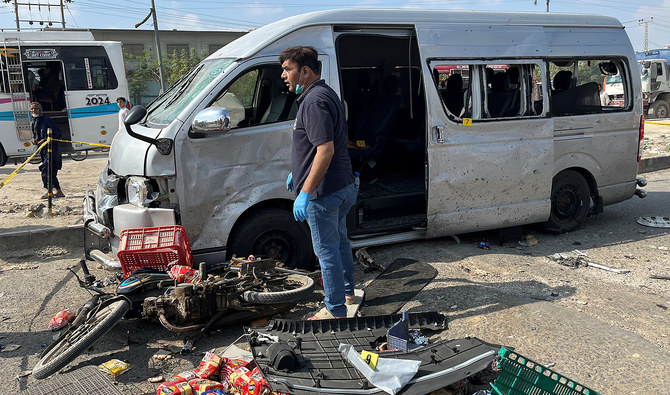
- Japanese survivors moved to a safe place in police custody, police says
- No immediate claim of responsibility for the attack from any militant group
KARACHI: Police in Pakistan’s southern city of Karachi shot down a suicide bomber and a militant on Friday as they attacked a vehicle carrying five Japanese nationals, all of whom survived, a police spokesperson said.
Islamist militants seeking to overthrow the government and set up their own strict brand of Islamic rule have launched some of Pakistan’s bloodiest attacks over the last few years, sometimes targeting foreigners, such as Chinese.
The Japanese survivors have been moved to a safe place in police custody, the police spokesperson, Abrar Hussain Baloch, said.
There was no immediate claim of responsibility for the attack from any militant group.
Pakistan seeks to engage with Global Gateway Strategy through European Investment Bank
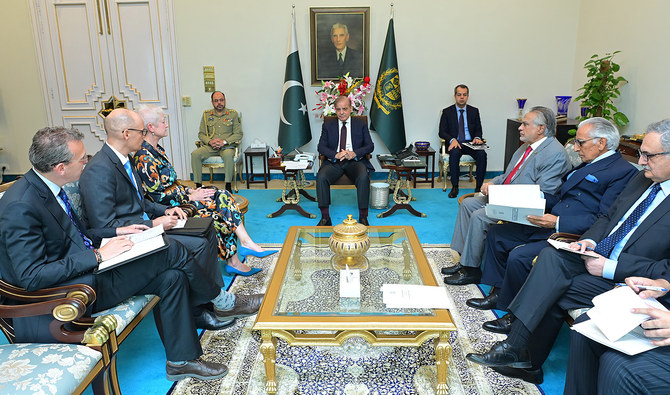
- EU to invest in infrastructure projects worldwide under Global Gateway Initiative
- Over the period 2021–2027, the European Union seeks to invest €300 billion
ISLAMABAD: Prime Minister Shehbaz Sharif on Thursday met Ambassador of the European Union, Riina Kionka, and sought the EU’s support to help Pakistan carry out important reforms in various sectors and engage with the Global Gateway Strategy through the European Investment Bank.
The EU is Pakistan’s second most important trading partner, accounting for over 14 percent of Pakistan’s total trade and absorbing 28 percent of Pakistan’s total exports. Pakistani exports to the EU are dominated by textiles and clothing.
“The Prime Minister appreciated the continuous support of the European Union to Pakistan regarding the GSP Plus scheme,” a statement from the PM’s office said about his meeting with Kionka.
“The Prime Minister said that the European Union can play an important role in providing consultation and expertise for important reforms in various sectors in Pakistan.”
Pakistan’s GSP+ status is a special trade arrangement offered by the EU to developing economies in return for their commitment to implement 27 international conventions on human rights, environmental protection and governance.
The current GSP framework came to an end in December 2023 but Members of EU Parliament (MEPs) voted in October to extend the current rules on the scheme for another four years for developing countries, including Pakistan.
During his meeting Kionka, Sharif expressed satisfaction over existing institutional mechanisms “meeting regularly to exchange views on further strengthening cooperation” and indicated Pakistan’s interest in engaging constructively with the EU’s Global Gateway Strategy through the European Investment Bank.
The Global Gateway Initiative is a worldwide strategy by the European Union to invest in infrastructure projects worldwide. The project was initiated by the EU Commission under the leadership of Ursula von der Leyen. Over the period 2021–2027, the EU will invest €300 billion.
The EU Ambassador briefed the PM on various cooperation initiatives, including an ongoing dialogue on migration and mobility issues between the two sides, as well as facilitating European businesses operating in Pakistan. Progress on the resumption of flights from Pakistan to EU countries was also discussed.













